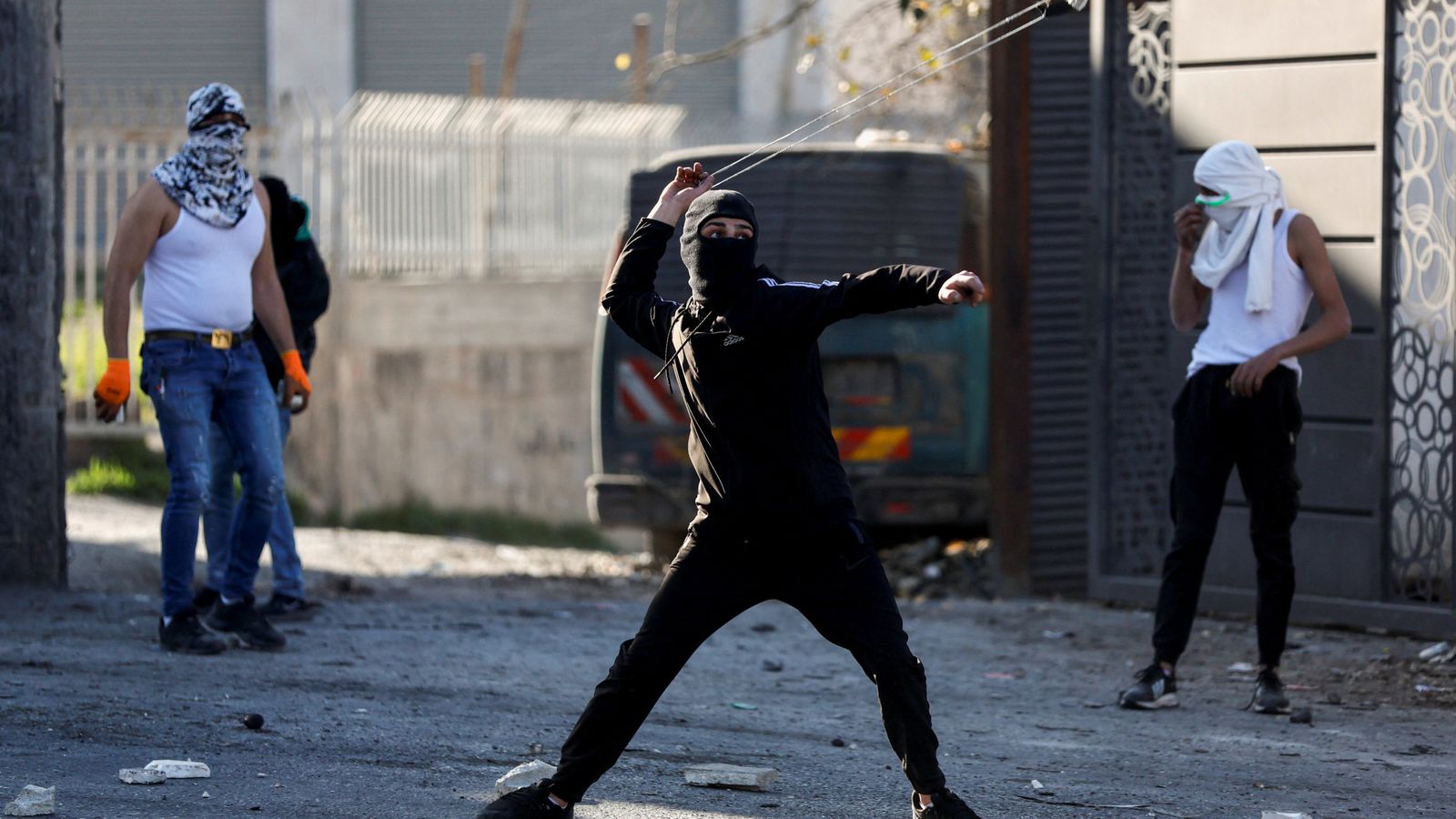Antony Blinken says US opposes anything that puts two-state solution ‘further from reach’ after violence in Jerusalem

The United States will “continue to oppose anything” that puts a two-state solution “further from reach” after one of the bloodiest months in the West Bank and East Jerusalem in several years, the US secretary of state has said.
Antony Blinken said the US opposes Israeli settlement expansion and any moves towards the annexation of the West Bank.
The US secretary of state spoke in a news conference in Jerusalem on the second day of a two-day visit to Israel where he has met with the country’s leader Benjamin Netanyahu and the Palestinian president Mahmoud Abbas.
His comments come days after two shootings, one by a Palestinian gunman and another by a Palestinian teenager, left seven people dead and five wounded in Jerusalem.
Meanwhile, some 35 Palestinians have been killed in fighting, including 10 who were killed in an Israeli military raid in the flashpoint town of Jenin last Thursday.
Mr Blinken said today: “The horrific terror attacks in Jerusalem, the escalating violence in the West Bank, have underscored the significant challenges to security and stability that the region faces and that we face.
“A rising tide of violence has resulted in the loss of many innocent lives on both sides… all sides must take steps to prevent further escalation of violence and restore calm.”
He continued: “It’s President Biden’s firm conviction that the only way to achieve (peace) is through preserving and then realising, the vision of two states for two peoples.
“The United States will continue to oppose anything that puts that goal further from reach.
Advertisement
“We’ve been clear that this includes things like settlement expansion, the legalisation of outposts, demolitions and
evictions, disruptions to the historic status of the holy sites, and of course incitement and acquiescence to violence.”
Mr Blinken also said that during his meetings in Israel and the occupied West Bank he had heard a “deep concern about the current trajectory”.
However, he also said that he heard concrete ideas from both sides that, if pursued, could help defuse the current situation.
Mr Blinken’s first visit since Mr Netanyahu returned to power this month at the head of one of the most right-wing governments in Israel’s history comes at a time of extreme tension between the two sides.
He said Palestinians were facing a “shrinking horizon of hope” that needed to change.
Amid rising anger at near-daily raids by Israeli forces in the West Bank, Mr Abbas’ Palestinian Authority (PA) suspended its security cooperation agreement with Israel last week after the largest incursion in years.
The operation saw Israeli forces penetrate deep into a refugee camp in the northern city of Jenin, setting off a gunfight in which 10 Palestinians died.
In January alone, 35 Palestinians have been killed in clashes with Israeli troops, in the bloodiest month since 2015, while officials say attacks on Palestinian property by Israeli settlers have also increased.
Mr Blinken’s trip to the region was already planned but coincided with one of the worst periods of violence in years.
In just 24-hours he met Israel’s prime minister, foreign minister and the Palestinian president, regularly calling on “all sides” to do more to reverse the worrying trajectory that has seen 35 Palestinians and seven Israelis killed since the start of the year.
He clearly grasps the severity of the situation but, as has become increasingly common with senior US diplomats visiting Israel and the West Bank, offered no concrete steps to change the dynamic.
Speaking to journalists at the US embassy in Jerusalem he reiterated the view that a two-state solution remains the only viable path to peace, security and prosperity for Israelis and Palestinians.
He’s right, but the same words have been uttered by every US secretary of state since the signing of the Oslo accords 30 years ago.
In the eyes of many observers the situation is worse now, and prospects for peace slimmer than ever.
Perhaps the announcement that senior members of his team will stay on to work on easing tensions is meant to provide short-term respite.
It won’t be enough. Israel’s new right-wing coalition government is trying to impose itself in the face of massive internal weekly protests against it. Palestinians in the West Bank are growing increasingly desperate under occupation and militancy is on the rise. The Palestinian leadership in Ramallah is incapable of providing the essentials to its people.
These are worrying times in the Holy Land. Stern words without real action will do little to change that.
On Friday, a Palestinian gunman killed seven people outside a synagogue in an east Jerusalem settlement on Friday.
The next morning, a 13-year-old Palestinian boy shot and wounded two Israelis elsewhere in east Jerusalem.
“The Israeli government is responsible for what is happening today, because of its practices that undermine the two-state solution and violate the signed agreements,” Mr Abbas said during Mr Blinken’s visit.
Mr Netanyahu has reinforced troops in the West Bank and promised measures to strengthen settlements there, but so far held off from more extreme steps.
On Tuesday, Mr Blinken met Israeli Defence Minister Yoav Gallant and discussed cooperation to stop Iran developing a nuclear weapon as well the situation in the West Bank.
Hopes of achieving a two-state solution, with a Palestinian state based largely in the West Bank, have all but disappeared since the last round of US-sponsored talks stalled in 2014.
The Biden administration has said it would re-establish a consulate for Palestinians shuttered by former President Donald Trump, but has yet to say when or where it will be opened.